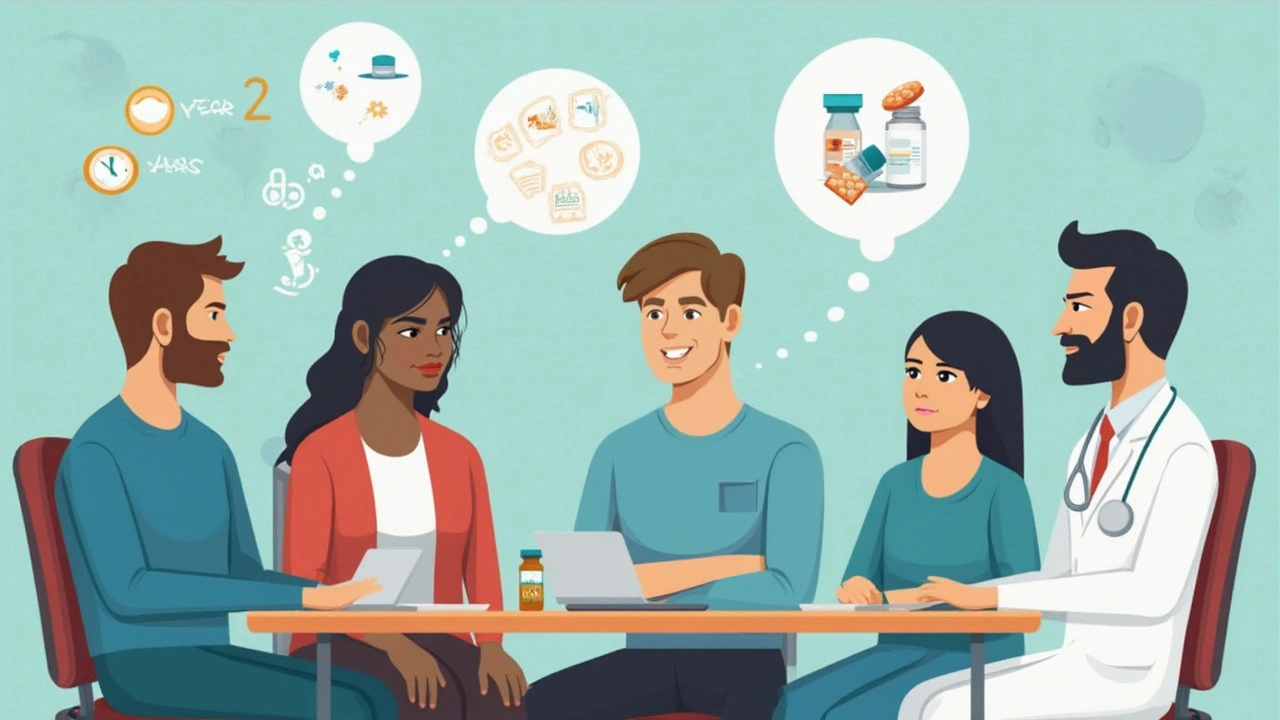Effexor: Uses, Side Effects, and What to Expect from This Antidepressant

Walk into any pharmacy in New Zealand or pop onto a mental health forum anywhere in the world and you’re bound to hear about Effexor sooner or later. This is a pill with a reputation – sometimes a lifeline, sometimes a rough ride. If you’ve ever found yourself searching for relief from depression or anxiety, chances are that Effexor (known chemically as venlafaxine) has appeared on your radar. It’s not the oldest or the flashiest antidepressant, but its popularity is hard to ignore. But why is it so widely prescribed? Is it worth its hype or the side effects people whisper about? Let’s face it: antidepressants are a tricky topic. Everyone seems to have an opinion, a story, a cautionary tale. Effexor is definitely no exception.
What Is Effexor? Understanding the Basics
Effexor, or venlafaxine, hit the prescription circuit in the mid-1990s and quickly became one of the top dogs for treating depression and anxiety. It belongs to a class of drugs called SNRIs – serotonin and norepinephrine reuptake inhibitors. That sounds bizarrely technical, but the gist is simple: this medication keeps more of two brain chemicals (serotonin and norepinephrine) floating around where your neurons can use them. More of these chemicals often means better mood balance and less anxiety swirling in your head.
The way Effexor boosts these chemicals is a bit like having a diligent German Shepherd (like my Rowan) fetch the sticks you throw, but instead of sticks, it’s brain chemistry, and instead of returning them, Rowan keeps more in the play field. Effexor comes mainly in two versions: immediate release (which you take two or three times a day) and extended release (which is usually just once daily, making it way easier for busy folks or anyone who hates checking the clock). It’s got a cousin called Pristiq (desvenlafaxine), which is sort of like a spin-off series, but Effexor is still the one most commonly handed out.
Doctors usually prescribe Effexor for major depressive disorder, generalized anxiety disorder, panic disorder, and sometimes even for social anxiety. If you’ve ever had that crushing, empty feeling or if worry is a shadow you can’t shake, your doctor might suggest Effexor as an option. Here’s a quick look at what sets this medication apart from older antidepressants like SSRIs (think fluoxetine or sertraline): it hits two neurotransmitters instead of just one. This double hit can be a game-changer for some people, especially if SSRIs haven’t cut it.
| Condition | Typical Starting Dose | Maximum Daily Dose |
|---|---|---|
| Major Depressive Disorder | 75 mg/day | 225 mg/day |
| Generalized Anxiety Disorder | 75 mg/day | 225 mg/day |
| Panic Disorder | 37.5 mg/day | 225 mg/day |
| Social Anxiety Disorder | 75 mg/day | 75 mg/day |
In New Zealand, Effexor is fully subsidized, so if you ever feel anxious about costs, it’s usually just the script fee. But remember: never jump to any medication just because it’s affordable or popular. Effexor is powerful — and powerful drugs deserve a good, honest conversation with a health professional before you swallow your first pill.

The Real Side Effects: Myths, Facts, and What Doctors Don’t Always Mention
Okay, so here’s where things get personal and a bit raw. Effexor can be amazing, but it’s also notorious for its side effects, especially during the first few weeks. Some people don’t bat an eye. Others feel like a bus just hit them. So, what happens when you take that first dose?
Classic mild annoyances include nausea (about one in three people, especially early on), dry mouth, sweating, a twitchy stomach, or not being able to sleep well at night. There’s often a headache, some dizziness when you stand up, and the super fun jolts called "brain zaps" if you miss a dose or stop suddenly. Sexual side effects happen too: loss of libido and trouble with orgasm can turn up, and few doctors bring it up unless you ask. Honest talk: Effexor has one of the trickiest discontinuation syndromes in the antidepressant world. If you forget your morning pill or stop cold turkey, you can get flu-like symptoms, a weird electric shock feeling in your head, mood swings, sweats, and straight-up confusion. It’s rough enough that online support groups have nicknamed it "Effexor withdrawal hell." Never quit without help – tapering with a doctor’s guidance is the only way to go.
- About 30% get mild nausea in the first month.
- Nearly 15% report weight gain after a year.
- 10% feel an increase in blood pressure (which doctors should monitor).
- Brain zaps affect around 20% during withdrawal or missed doses.
If things get really uncomfortable, most side effects settle down after 2–4 weeks. Some folks (including one friend of mine) swear by morning doses, lots of water, and eating before taking the pill to help dodge nausea. Others say small habits, like keeping a notebook or an app to track mood and sleep, help them and their doctors spot when side effects are lurking or if a switch is needed.
Important tip: Effexor isn’t for everyone. Don’t use it if you have uncontrolled high blood pressure, or if you’re on MAO inhibitors — that combination is a hard no. And though rare, some people experience elevated cholesterol or sodium drops that your doctor should check for. Always read the leaflet, but also, don’t be afraid to pipe up if you think something’s off.
People with a family history of bipolar disorder need to be cautious: antidepressants like Effexor can sometimes nudge people toward manic episodes. And while it’s not common, there have been cases of increased suicidal thinking, mainly in younger people within the first few weeks. So if you, or someone you love, seems off or suddenly reckless, check in. A simple chat can literally save a life.
One more thing hardly anyone tells you: Effexor can make you sweat like you’ve run a marathon, even when it’s cold and rainy (typical Wellington summer). Not dangerous, but bring extra deodorant.

Finding the Rhythm: Living Well on Effexor
Stepping onto any new medication feels a bit like getting a new roommate: you’re never fully sure how life will change, but small adjustments make all the difference. Living with Effexor is no different. The first thing I always tell friends (and anyone in my online support group) is to give it time. Expect a few wobbly days or weeks. Most people start feeling some change around week two, but the full benefits don’t show up until around four to six weeks. It’s slow chemistry, not instant magic.
Sticking to a daily routine helps. Take it at the same time. Morning is usually best, unless you find it makes you sleepy — then swap to the evening, but let your doctor know. Charging through the side effects works better if you’re not battling them alone; bring someone you trust into your circle. Maybe it’s a partner, maybe your flatmate, or that one mate who’s not weird about mental health stuff. Keep them in the loop after you start or if you’re making any changes with your doctor.
Food makes a big difference. Effexor tends to play nicer with a full stomach. If you’re feeling queasy, dry crackers, ginger tea, or even a banana can settle things enough so you don’t have to barrow for the rest of the day. Hydration helps too — especially for those sweaty moments.
Here's a tip from experience: don’t be shy with symptom tracking. Write down side effects or mood changes in a notebook (I actually keep a note on my phone; Rowan the German Shepherd would probably eat a paper version if given half the chance). Sharing these notes on your next check-in is gold for your GP — you’ll remember what really happened, and your doc gets the real story, not just the polite version.
Now, about interactions. Alcohol isn’t officially forbidden, but it’s easy to feel the effects faster, so better to go slow or skip it until you know how your body’s reacting. As with all antidepressants, mixing Effexor with certain painkillers, migraine meds, or other mood meds needs care — always check with a pharmacist or doctor. And don’t mix it up with herbal stuff like St John’s Wort; that can get messy fast with serotonin syndrome (which is rare, but can be life-threatening).
If you notice anything odd with your eyes — pain, changes in sight, swelling — call your doctor. Some data links Effexor, especially at higher doses, with increased risk of angle-closure glaucoma (again: rare, but real). Ditto with unexplained bruising, nosebleeds, or gum bleeding; the med can subtly mess with your platelets.
Never double up if you miss a dose. Just take it when you remember, but only if it’s not too close to your next scheduled dose. Most tablets are extended-release, so doubling up isn’t just unhelpful, but risky. Store Effexor at room temperature and out of reach of any curious pets — at my house, that means Rowan can’t turn every container into a chew toy.
Thinking about coming off? Don’t just stop. Taper slowly under a doctor’s eye to avoid the infamous withdrawal. For some, it’s super easy; others need a micro-dose decrease over weeks. There are no medals for quitting fast, but a lot to gain from playing it safe.
Many people worry about long-term side effects, and so far, research shows Effexor doesn’t increase cancer risk or permanent organ damage at standard doses. What you will notice is that your mental health story might need to adjust as your life changes. Effexor isn’t a forever solution for everyone, but for many, it gives just enough breathing room to work on big life stuff — therapy, relationship repair, new routines.
Here’s the real bottom line: Effexor is neither a miracle cure nor a monster. It’s just a tool — a powerful one — in the huge toolbox for tackling depression and anxiety. If you use it wisely, with support, tracking, honest conversations, and a bit of patience, it can make the journey lighter. Always keep open communication with your health team, and watch your own signals. And if you find yourself needing a hug, my big shepherd Rowan is always up for one.




Ari Kusumo Wibowo
Alright, so Effexor isn’t some miracle cure-all, but let’s get real here—it does help a ton of people dealing with depression and anxiety. Sure, the side effects can be annoying as hell—like that constant nausea or the sweating—but if you know what to expect beforehand, it’s way easier to power through.
One thing that’s critical: don’t just stop taking it cold turkey because the withdrawal can be brutal. I've seen people mess that up and suffer for weeks. Patience is key.
Also, always talk to your doc about any weird feelings or mood swings; it’s better to catch those early. This article hits the real points—it’s straightforward and doesn’t sugarcoat what Effexor really does to your body and mind.
Anyone here has experience with the dose adjustments? I want to hear if it helps ease the side effects or just drags everything out longer.
Hannah Gorman
Honestly, while I acknowledge the utility of Effexor, it astounds me how lightly some regard the seriousness of side effects associated with this medication. It's not just about managing mild nausea or sweating; this drug can profoundly alter a person's emotional and physiological state.
Patients often require a meticulous and ongoing assessment, given the risk of elevated blood pressure and the sobering possibility of severe withdrawal symptoms. It is the medical community's responsibility to ensure comprehensive patient education and cautious prescription.
The article provides a decent overview, though I would have appreciated a deeper dive into the psychiatric implications and long-term data on Venlafaxine use.
Does anyone know if there are reliable studies comparing Effexor’s withdrawal timeline to that of other SNRIs? This seems crucial for anyone considering switching medications.
Tatiana Akimova
Yo, I've been on Effexor for over a year, and lemme tell you, it’s a rollercoaster! Those early weeks? Total chaos in my head — anxiety spikes, restless legs, headaches like a freight train. But what really helped was having a solid routine and staying active.
I also found journaling my moods and symptoms really helped me track what was getting better and what wasn’t. Has anyone else done that? It’s like a therapy buddy on paper.
And yeah, when you feel like giving up 'cause the side effects suck, just push a little more. Don’t let this medication win. It’s about finding the balance and remembering that every person reacts differently.
Props to the article for spelling it out clearly. I just wish docs emphasized lifestyle support alongside the meds more.
Calandra Harris
Look, this drug is too damn overprescribed these days. Everyone wants a pill, no one wants to face real solutions. Effexor, like any antidepressant, isn’t some magic bullet; it merely suppresses symptoms while leaving the root causes ignored.
We need to rethink our approach to mental health in this country — less pharma, more personal responsibility and national pride in our struggles. Overmedicating weakens us.
Side effects? Just symptoms of a bigger problem — a society too quick to medicate instead of to endure. Effexor only paper over cracks.
Maybe the article should have addressed why we’ve lost sight of fundamentally overcoming adversity without drugs.
Dan Burbank
Though I find much domestic debate on Effexor to be somewhat pedestrian and devoid of nuance, I must insist on the medicinal virtues this agent embodies. Venlafaxine's efficacy, despite what some would call its onerous side effect profile, places it at an elevated pedestal among its antidepressant brethren.
The essential data regarding pharmacodynamics and dosage titration reveal a sophistication in treatment not afforded by less studied alternatives. If only the mainstream conversation would ascend to such cerebral heights.
Concerning withdrawal, one must never cede to reckless cessation but instead adopt a judicious taper under vigilant medical supervision.
Does anyone here engage with the latest empirical analyses on Effexor’s efficacy relative to SSRIs or even CBT modalities? Enlightenment through knowledge should be our collective goal.
Anna Marie
This article truly is a helpful resource for anyone stepping into the world of Effexor. What’s often overlooked is the emotional toll alongside the physical side effects, and this piece touches on that balance delicately.
When supporting a loved one on Effexor, patience and understanding are indispensable. The emotional shifts can be confusing for both the patient and their close circle.
It is important to maintain open dialogues with healthcare providers and seek support groups, which many find reassuring during this transitional phase.
Does anyone have suggestions for complementary therapies that might ease the transition or side effects in conjunction with Effexor?
Abdulraheem yahya
Living on this medication, I can tell you, it’s a mixed bag. I started on a low dose, as recommended, and gradually noticed changes—some good, some downright challenging. The important thing is not to lose hope and keep communicating with your doc.
Also, your lifestyle plays a huge role, from diet to sleep hygiene. I tried meditation and light exercise, which helped me tackle some side effects. It’s a combination thing, really.
Effexor works differently for everyone, so what works for me might not work for you, but don’t hesitate to experiment safely with added supports.
Real talk: social support is huge. Whether it’s on forums like this or in person, sharing experiences bridges the isolation.
Preeti Sharma
Honestly, the approach to antidepressants like Effexor is almost a mirror to society’s superficial attempts at fixing deep-rooted issues. It’s not enough to just take the pill and expect transformation—what about the philosophical understanding of our own suffering and self?
Pharmaceuticals can blunt pain, yes, but do they teach resilience or forge a deeper insight into the human condition? I think not.
The article serves its purpose, yet we must question the broader narratives around medication. Are we merely numbing ourselves in an increasingly disjointed world?
Ted G
There’s something to be said about the push to medicate with Effexor and drugs like it that isn’t quite right. I wonder if the pharmaceutical companies have too much sway here. What about the hidden side effects they don’t talk about—the cognitive fog, the emotional blunting?
Do we ever really get the full picture, or are patients just guinea pigs in a bigger scheme? You have to dig deep because what they say on the surface can be very different from lived experience.
Anybody else paranoid about what they’re putting into their bodies on meds like this?
King Shayne I
Despite my tendency to quickly jot down my thoughts and opinions, I have to admit this article provided a fairly decent primer on Effexor. I appreciate the no-nonsense breakdown on side effects and what patients might expect beyond the usual fluff.
One gripe is the lack of emphasis on how critical adherence is to avoid withdrawal symptoms. I learned that the hard way once and never want to repeat that experience. Folks, respect the taper schedules.
Also, it could do with a bit more guidance on how to communicate issues effectively with your psychiatrist because honestly, that clarity makes all the difference in your treatment outcomes.
jennifer jackson
The hopeful aspect of this article is quite encouraging for those just starting Effexor. It’s refreshing to see a focus not just on the negatives but also on managing strategies and what one can reasonably expect day-to-day.
In my opinion, combining Effexor with therapy sessions creates a stronger foundation for recovery than medication alone. It’s about addressing the whole person, not just the chemical symptoms.
Let’s remember to support each other openly without stigma as we navigate these complex journeys.